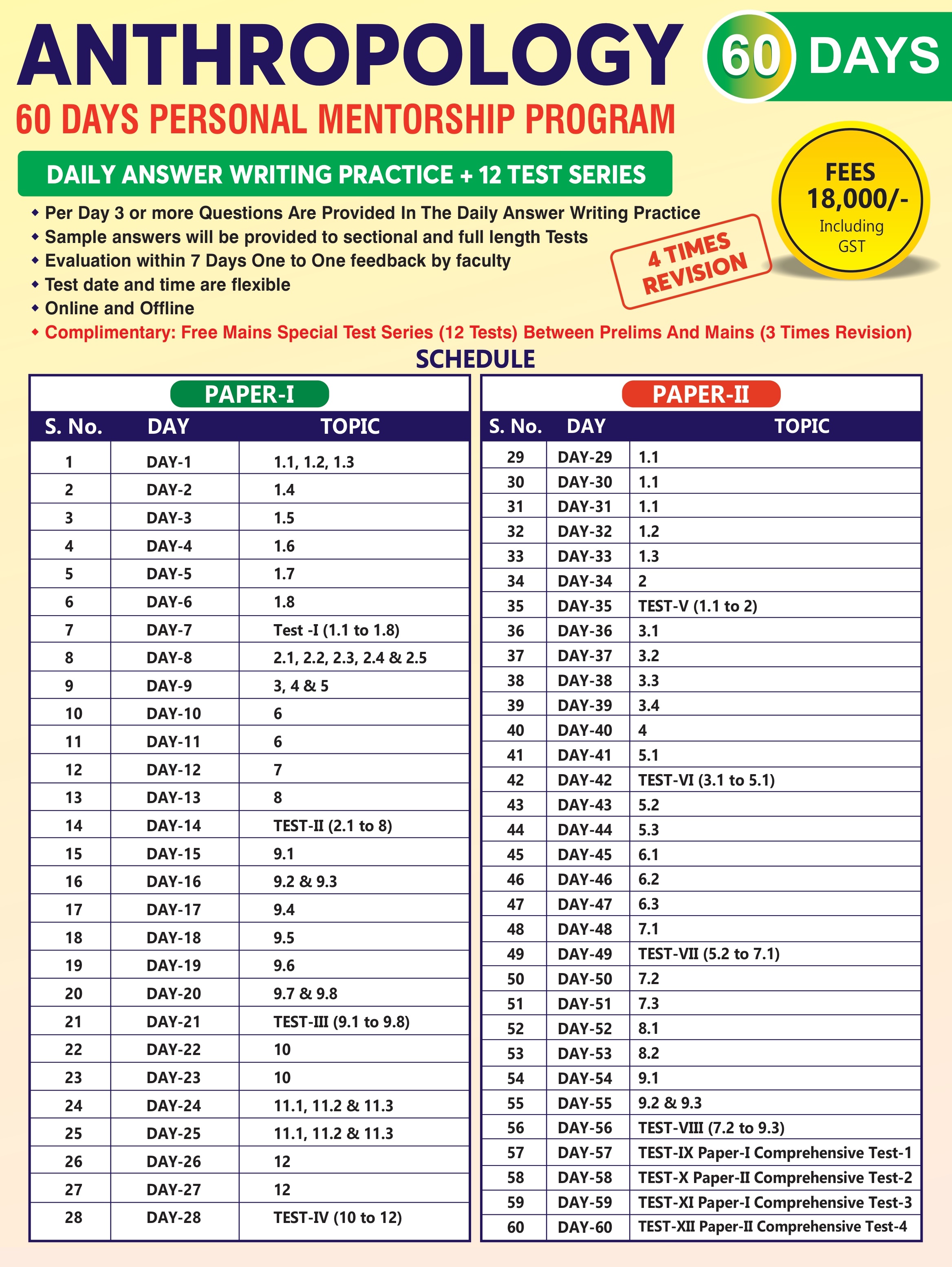
Examine the impact of Forest Policies from 1878 to 2006 on land alienation and deprivation of rights of tribal communities in India.
(15 Marks) Anthropology Optional Paper CSE 2024
Introduction
The relationship between tribal communities and forests in India is ancient and symbiotic, with forests forming the basis of their livelihood, culture, and identity. However, colonial and post-colonial forest policies, particularly from 1878 to 2006, have had profound impacts on tribal communities, leading to land alienation and the deprivation of rights over their traditional habitats. These policies were often centered around the extraction of resources, prioritizing state control and commercial interests over the customary rights of tribal populations.
Main Body
Indian Forest Act of 1878:
The Indian Forest Act of 1878 was the first significant colonial legislation that asserted state control over forests. This Act categorized forests into reserved, protected, and village forests, severely restricting tribal access to reserved forests.
Impact on Tribal Communities: The act alienated tribal communities from their traditional lands, curtailing their ability to collect forest produce, practice shifting cultivation, or hunt. It laid the foundation for a system where forests were viewed as state property for revenue generation rather than a livelihood resource for tribals.
Forest Policy of 1952:
After independence, the Forest Policy of 1952 reinforced the colonial view of forests as a national resource for economic development. It prioritized commercial forestry and industrial timber extraction, largely neglecting the rights of tribal communities.
Impact on Tribals: The policy further entrenched the marginalization of tribals, as it did not recognize their customary rights over forest lands. Large-scale deforestation and industrial projects displaced many tribal communities, leading to economic deprivation and loss of traditional livelihoods.
Forest Conservation Act of 1980:
The Forest Conservation Act of 1980 was introduced to prevent deforestation and maintain ecological balance. It restricted the use of forest land for non-forest purposes without prior government approval.
Impact on Tribals: Although the Act had environmental goals, it further restricted the ability of tribal communities to use forests for traditional purposes. Tribals found themselves caught in legal conflicts over forest land use, and their dependence on forests became criminalized.
Scheduled Tribes and Other Traditional Forest Dwellers (Recognition of Forest Rights) Act, 2006 (FRA):
The Forest Rights Act (2006), often seen as a corrective measure, recognized the historical injustices done to tribal communities. It sought to restore the rights of tribal and traditional forest dwellers over the land and resources they had been denied for over a century.
The FRA provides for individual and community forest rights, including the right to collect minor forest produce, manage community resources, and protect traditional lands from external encroachment.
Positive Impact: The FRA aimed to reverse land alienation and empower tribal communities by restoring their traditional rights over forest land. It was a landmark legislation that acknowledged the indigenous knowledge and role of tribals in forest conservation.
Implementation Challenges: Despite its progressive framework, the implementation of the FRA has been inconsistent across states, with bureaucratic delays and lack of awareness limiting its effectiveness. Tribal communities continue to face displacement for infrastructure projects, mining, and tourism, even after the enactment of the FRA.
Land Alienation and Rights Deprivation:
Colonial Legacy of Land Alienation: The land alienation of tribal communities began with the colonial forest policies, where the state asserted control over forests and displaced tribals in favor of commercial logging and plantation. This legacy continued into the post-independence period.
Encroachments and Displacement: Large-scale development projects, such as dams, mines, and infrastructure development, have led to mass displacement of tribal communities from their traditional lands. The loss of forest land has had devastating effects on their livelihoods, food security, and cultural identity.
Criminalization of Tribal Practices: Forest policies criminalized many traditional tribal practices, such as shifting cultivation, grazing, and the collection of minor forest produce. Tribals often faced legal repercussions for activities that were central to their sustenance.
Conclusion
The forest policies from 1878 to 2006 have had a long-lasting and detrimental impact on tribal communities in India, leading to land alienation and the deprivation of customary rights. While these policies prioritized state control and economic interests, they marginalized tribal populations by cutting them off from their traditional sources of livelihood. The Forest Rights Act of 2006 represents a crucial step in reversing these historical injustices and restoring tribal rights, but challenges in implementation and continued displacement mean that tribal communities still face significant struggles in regaining their rightful control over forest resources. A concerted effort is needed to ensure that the rights recognized under the FRA are fully realized, protecting both the socio-economic well-being and the cultural heritage of India's tribal populations.
Anthropology Test Series Programme (Online + Offline))
We provide Anthropology Daily Answer Writing a range of programs designed to cater to various stages of UPSC preparation. Whether you're just starting out, have attempted the Mains before, or are getting ready for Mains 2024, we have the right option for you. Allow us to assist you in choosing the course that best fits your needs.
|
Level of Preparation |
Test Series Program |
Test Series Content |
Test Schedule |
|
Self-study of Anthropology Optional |
Anthropology 100 Days Personal Mentorship Program |
Daily answer writing, 34 sectional tests, 6 comprehensive tests, and complementary Mains Special 12 tests (between prelims and mains) |
|
|
Revise whole syllabus through Daily Answer Writing Practice and Tests |
Anthropology DAW Mentorship Program |
Daily Answer Writing Practice and 8 sectional and 4 Full Length tests |
|
|
Revise whole syllabus through Sectional and Full Length Tests |
Anthropology Tier- I T-40 Test Series |
34 Sectionals and 6 Full Length Tests |
|
|
Written Mains earlier and need more practice |
16-Anthropology Tier II Test Series |
10 sectional and 6 Full-Length Tests. |
|
|
Cleared Prelims 2023 and are preparing for Mains 2023 |
Mains Special 12 Tests program |
8 Sectional and 4 Full-Length Tests |
ANTHROPOLOGY MAINS SPECIAL COURSES
Enroll in our Anthropology Mentorship Program today and take the first step towards achieving your UPSC goals!
1) If you are going for Self study of Anthropology Optional and looking for a Comprehensive Program that includes Daily Answer Writing, 34 Sectional tests, 6 Comprehensive tests, and Complementary mains special 12 tests (between prelims and mains), our Anthropology 100 Days Personal Mentorship Program is the perfect choice.
2) If you want to revise Whole Syllabus through Daily Answer Writing Practice and 8 sectional and 4 full length tests, then our Anthropology DAW Mentorship Program is the best fit for you.
3) If you want to revise Whole Syllabus through 34 Sectionals and 6 Full Length Tests then Anthropology Tier- I T-40 Test Series is for you.
4) If you have written Mains earlier and need more practice, then our 16-Anthropology Tier II Test Series is a great option. This test series includes 10 sectional and 6 full-length tests.
5) if you have cleared Prelims 2023 and are preparing for Mains 2023,our Mains Special 12 Tests program is a must-have. This program includes 8 sectional and 4 full-length tests to help you prepare for the big day.
For more information on Vijetha IAS Academy’s Anthropology mentorship programs Deatils : https://vijethaiasacademy.com/anthropology-test-series
Anthropology 100 Days Personal Mentorship Program ( 7 + 3 Times Revision )

Anthropology 60 Days Personal Mentorship Program ( 4 + 3 Times Revision )

For more information: https://vijethaiasacademy.com/anthropology-test-series
Details Of Anthropology Classes Program
Top Anthropology Optional IAS Coaching Center in Delhi Vijetha IAS Academy | Best Anthropology Optional IAS Coaching in Delhi
Fee Structure:
- Tier 1: Rs. 55,150/- (3 Years Validity of Offline/Live Batch)
- Tier 2: Rs. 42,000/-
- Tier 3: Rs. 36,000/-
Batch Size: 50 – 60 Students
UPSC Notes
Anthropology Optional IAS Coaching Notes, IAS Exam Preparation Booklets, IAS optional coaching Notes, UPSC Coaching Notes, Video Lectures, Live Classes with faculty, Chat Facility Available
Teachers Name: N P Kishore Sir
Past Result
- Last Years Result 2023
- 35 Total Selections in CSE 2023
Google Reviews: 4.9 out of 5 stars
Website: Vijetha Anthropology Optional IAS Coaching in Delhi (https://vijethaiasacademy.com)
Faculties of Vijetha IAS Academy
- N P Kishore Sir
Features
- Vijetha IAS Academy offers Online and offline Courses for better preparation of Anthropology Optional Strategy for UPSC in Delhi.
- For better Anthropology optional Exam Preparation, Vijetha IAS Academy Delhi Conducts the Motivational IAS Session.
- Vijetha IAS Academy provides you with the CASE STUDIES on the pattern of the real-time IAS Exam which is helpful for better preparation of the Best Coaching for UPSC Anthropology Optional Optional IAS Examination.
- DAW & WAW – Revision Through Daily & Weekly Answer Writing Practice is offered by Vijetha IAS Academy for better result of the Anthropology Optional IAS examination.
Advantages of joining Vijetha IAS Academy
- Best Faculties for Anthropology Optional IAS Coaching in Delhi
- Best facilities, infrastructure and updated Case Studies Booklets and Notes for better preparation of the Anthropology Optional IAS Examination in Delhi.
- Best result in Past years for Anthropology Optional Strategy for UPSC Examination in Delhi
- Best Rated coaching institute for Anthropology Optional IAS Examination in Delhi.
- Vijetha IAS Academy also provides recorded lectures videos, notes which is very helpful for better preparation of Anthropology Optional IAS Coaching in Delhi
Fees Structure of Vijetha IAS Academy
|
Tier 2 |
Tier 1 |
Tier 3 |
BATCH STARTS FROM |
|
42,000/- |
55,150/- (3 Years Validity Offline/Live Batch) |
36,000/- |
REGISTRATION – START |
Fees Structure of Vijetha IAS Academy
|
Course Name |
Fees Amount |
Course Duration |
|
GS Offline (Pre + Mains+ CSAT) with Essay+Answer Writing |
Rs.99,000 (Including GST) |
400+ Days |
|
GS Online |
Rs.18,999 (Including GST) |
400+ Days |
|
GS Mentorship Programme |
Rs.29,999 (Including GST) |
1 Year |
For more information on our courses, visit our Anthropology Courses page. Explore our Test Series and Online Courses for flexible learning options.
Vijetha IAS Academy
Add. 2nd Floor, 50, Shankar Road, Block 7, Old Rajinder Nagar, Rajinder Nagar, New Delhi, Delhi 110060
MOB. 096508 52636
Open 7 Am: Closes 9 PM
_________________________________________________________________________________________________________________
Keywords: Synergistic Effects of Biological and Cultural Factors in Human Evolution , anthropology 2024 question paper, Anthropology optional subject question paper 2024, Anthropology optional 2024 question paper, Anthropology Optional Coaching UPSC, Vijetha IAS Academy Anthropology, Anthropology crash course UPSC, Anthropology daily answer writing UPSC, Kishore sir Anthropology
